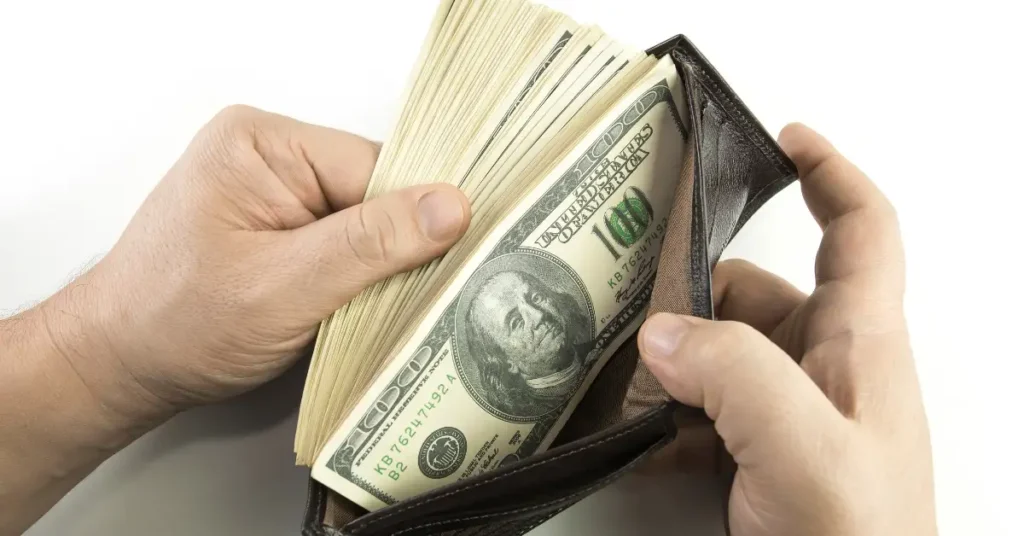When contemplating the lavish ways of living of NBA athletes, it’s natural to ponder, “do NBA players receive weekly salaries?” Given their contracts worth millions and lucrative sponsorship agreements, it’s a reasonable inquiry.
Do NBA Players Get Paid Weekly?
NBA players typically get paid bi-weekly during the regular season1. However, the specific amount they earn depends largely on their individual contracts and the salary cap. The salary cap limits the total amount of money a team can spend on its players, ensuring a level playing field across the league. Factors like years of experience, performance, and marketability come into play when determining a player’s contract. Additionally, some players have bonuses written into their contracts, tied to specific achievements like making the All-Star team or winning an MVP award2.
When it comes time for players to receive their hard-earned money, most teams utilize direct deposit, sending funds straight into their bank accounts. There’s more to their paycheck than just their base salary, though. Players also pay taxes on their income, just like anyone else. One unique aspect of taxation for NBA players is the “jock tax,” which requires them to pay state taxes in every state they play games in3. This can lead to a more complex tax situation for professional athletes compared to the average person.
An intriguing component of NBA salaries is the escrow system4. This ensures that the league’s revenue is split fairly between the players and team owners. A percentage of each player’s salary is withheld and placed in an escrow account. At the end of the season, if total player salaries exceed the agreed-upon revenue split, money is removed from the escrow account and given back to the team owners. The money is returned to the players if player salaries are below the agreed-upon split.
Footnotes
NBA Players’ Payment Schedule
NBA players have different options when it comes to receiving their payments. They can choose between single payments for the entire year, quarterly, monthly, bi-weekly, or even every week. This flexibility allows players to manage their finances according to their preferences and needs.
Most commonly, NBA players are paid every two weeks, with 24 or 26 bi-weekly payments throughout the season. These payments are typically made as direct deposits into the player’s bank account, ensuring quick and secure access to their hard-earned money.
In-Depth Look at Contract Structures
Firstly, it’s essential to know that NBA contracts are primarily paid bi-weekly during the NBA season. With that said, let’s dive into the specifics.
In NBA contracts, a significant portion of a player’s salary is guaranteed. This means the player is assured a fixed amount, regardless of their performance or injuries. Additionally, players may receive signing bonuses—lump sum payments made upon signing a contract. Although not as common in the NBA as in other sports, these bonuses can help sweeten the deal.
Performance bonuses and incentives are another aspect of NBA contracts. Players can earn additional money based on their on-court performance, ticket sales, and personal achievements, such as individual awards or selection to the All-Star Game. It’s worth noting that some performance bonuses are conditional and can be renegotiated during a contract.
Now, let’s talk about endorsement deals. Apart from their NBA contracts, players can make money by endorsing various products and services. These deals are typically separate from their contracts and can be a significant source of income for famous players.
How Playoffs and Bonuses Affect NBA Players’ Paychecks

In the NBA, salaries are usually paid bi-weekly during the regular season, which lasts from October through April. While the base salary typically remains the same during the playoffs, there are other ways that players can earn additional income. These include performance bonuses, league-wide playoff pools, and endorsement deals.
Performance bonuses are typically negotiated as part of a player’s contract. Though the NBA’s salary cap restricts teams from providing significant bonuses for postseason performances, some players still include these incentives in their contracts. These bonuses can be awarded for achievements like making the All-Star team, competing in the playoffs, or winning awards like the Most Valuable Player.
Another source of compensation during the playoffs is the league-wide playoff pool. This pool is divided among the teams based on their postseason success, with more significant amounts going to teams that advance further. While the playoff pool reached a record $12 million in 2010, not all this money is allotted to playoff performances. The team usually determines the distribution, with each player receiving a share based on their contribution.
Lastly, NBA players can boost their income through endorsement deals. Players can become more attractive to potential sponsors as they perform well in the playoffs and gain more visibility. This can lead to opportunities for lucrative endorsements and partnerships that can increase a player’s overall earnings.
A Comparison of NBA Salaries with Other Sports
NBA players are known for earning some of the highest salaries in professional sports. The average salary in the NBA is around 7.8 million euros per year. In comparison, the average salary for NFL players is much lower, with some sources stating it’s around 2.7 million dollars annually. The MLB has an average wage of approximately 4.4 million dollars per year.
Looking at golf and tennis, the individual nature of these sports makes their salary structure different from team sports. In professional golf, player earnings depend on tournament performances, sponsorships, and endorsements. The same goes for tennis players; their earnings are based on tournament winnings, sponsorships, and endorsements.
Although salaries in these sports can vary greatly, it’s essential to consider factors such as the number of athletes in each sport, the length of their respective seasons, and the revenue generated by these sports. For instance, the NBA has a smaller roster than the NFL, allowing for more substantial average salaries. Additionally, the NBA season consists of 82 games, compared to the NFL’s 17 games, which could account for the NBA’s higher average wages.
The Impact of Collective Bargaining Agreement on NBA Salaries

When you wonder whether NBA players get paid weekly, it’s essential to consider the influence of the NBA’s collective bargaining agreement (CBA) on their salaries. The CBA plays a crucial role in deciding how players are paid and the overall structure of their compensation.
The NBA CBA is an agreement between the NBA and the National Basketball Players Association (NBPA) that outlines various provisions regarding player contracts, the team’s salary cap, and other financial aspects of the league. The CBA is renegotiated periodically, and the most recent agreement was ratified.
A critical aspect of the NBA CBA is the introduction of a salary cap, which limits the total amount a team can pay its players. This helps to maintain a competitive balance across the league by preventing wealthier teams from outspending others and dominating the sport. The salary cap is calculated based on the league’s overall revenue, adjusting for factors like projected growth and player benefits.
The CBA also includes provisions for minimum and maximum salaries for players, varying based on factors such as the player’s tenure in the league and previous contract value. For instance, the agreement increased the upper limits on extensions from a 120% increase to a 140% increase on their current deals. This change could significantly impact the futures of star players, allowing them to sign more significant extensions with their current teams.
Defining Roles of Teams in NBA Players’ Salaries
When it comes to understanding how NBA players are paid, a crucial question to ask is: do NBA players get paid weekly? While their pay frequency may vary, another essential aspect is the role of teams in determining NBA players’ salaries. This section will delve into the involvement of teams like the Golden State Warriors and Oklahoma City in shaping their players’ paychecks.
Each NBA team has a team’s salary cap that plays a significant role in defining players’ contracts. The salary cap limits how much teams can spend on their players during a season. Teams like Golden State and Oklahoma City must adhere to this cap and strategize accordingly when recruiting or re-signing players.
Some critical factors in determining a player’s salary within a team include their skills, experience, and the team’s available budget. Among the many elements governing a player’s pay, here are a few:
- Minimum salary
- Veteran’s minimum
- Rookie scale contracts
- Maximum salary
For example, the Golden State Warriors might have a different approach to managing their salary cap than the Oklahoma City team. Each team’s general manager and team owner play vital roles in deciding how to allocate their budget to players to assemble a competitive roster while staying within the salary cap.
Basketball Greats and their Salaries
Do NBA players get paid weekly? While that’s a standard question, it’s essential to know that NBA contracts are usually paid bi-weekly during the season. Now that we have that sorted let’s dive into the world of basketball greats and their salaries.
LeBron James is undoubtedly one of the top players in the NBA. During the 2017-18 season, he was the second-highest-paid player with a salary of $33.3 million. In contrast, Stephen Curry surpassed LeBron James as the highest-paid player during the same season, receiving $34.7 million.
Russell Westbrook and Kevin Durant are also among the highest-paid basketball players. With their exceptional skills on the court, they’ve secured lucrative contracts, making them some of the wealthiest athletes in the world.
Michael Jordan, a legendary player and an icon in the basketball industry, has long retired from playing. However, his earnings continue to soar thanks to his lucrative endorsements and business ventures. He’s undoubtedly one of the wealthiest former basketball players globally.
James Harden is another top player in the NBA, known for his incredible scoring ability. With his status as an elite player, he can command a massive salary, putting him on the list of highest-paid NBA players.
Paul George made a notable impact in the NBA, resulting in substantial earnings throughout his career. Thanks to his numerous endorsements and on-court prowess, he remains one of the top-earning players in the league.
Lastly, let’s talk about Kobe Bryant, a true icon who left an undeniable mark on the basketball world. Throughout his career, he earned staggering amounts through contracts, endorsements, and business ventures.
Paying Taxes on NBA Salaries
NBA players, like everyone else, must pay taxes on their income. One of the central taxes they face is federal income tax, which can significantly decrease their take-home pay. On top of that, these athletes are also subject to what’s known as the “Jock Tax” – a state tax that must be paid when they play games in different states.
For example, if a player has a game in California, they’ll be required to pay taxes to the state of California for the portion of their income earned during the time spent there. This can complicate things for athletes constantly traveling and playing games across the country, as they have to keep track of various state tax rates.
Famous NBA Teams and Their Salaries
You might be wondering, “Do NBA players get paid weekly?” While pondering this question, you’re probably also curious about the famous NBA teams and their respective salaries. In this section, we’ll explore some top teams, such as the Golden State Warriors and Oklahoma City, and discuss their player salaries.
The Golden State Warriors are known for their success and high-profile players. For instance, during the 2020 NBA season, Stephen Curry was the highest-paid player on the team, earning a staggering salary from ESPN. As player salaries continue to increase over time, you can expect the Warriors’ star players to command even more impressive figures.
On the other hand, Oklahoma City is another well-known NBA team with notable player salaries. Although their wages might not reach the heights of those in Golden State, Oklahoma City players still earn respectable amounts, reflecting their talents and value to the team.
It’s essential to understand that NBA salaries can vary significantly depending on factors like player skill, team performance, and marketability. Remember that the average NBA player’s salary is around $6 million per season, with superstars like LeBron James and Kevin Durant earning even more due to their exceptional skills and team contributions.
Influence of Off-Season and Injuries on NBA Salaries

The NBA season usually includes regular-season games and playoffs towards the end. With a busy schedule and intense competition, players are prone to injuries. When a player gets injured, their salary depends on the terms and conditions of their contract. Generally, NBA players receive payment while recovering from injuries, as medical assistance is often included under specific circumstances specified in their contracts.
Salary distribution in the NBA is rather complex. In most cases, salaries can be structured so that players might receive payments in installments rather than weekly. For instance, a three-year deal worth $30 million could be divided so that a player is paid less during the first year and gradually more in subsequent years. This approach primarily depends on the team’s salary cap and willingness to take risks.
During the off-season, NBA players usually have a break from games. They can get involved in other activities to generate additional income, such as endorsement deals, public appearances, or even hosting basketball camps. It’s common for top players to earn more from endorsements than their actual NBA salaries during the off-season.
Retirement, Endorsements, and Other Revenue Streams
While it’s essential to know how frequently these athletes receive their salaries, let’s also look at the bigger picture. This section will explore how NBA players continue to generate income through retirement, endorsement deals, investments, and more.
Retirement is an essential aspect of an NBA player’s financial planning. Players receive a pension when they retire, which increases by nearly 50% if they start receiving payments at 50. This pension can be a significant source of income for retired players and helps them maintain a comfortable lifestyle post-basketball.
Another critical component of an NBA player’s revenue stream is endorsement deals. These partnerships with major brands like Nike or Apple allow players to earn significant sums outside their on-court salaries. High-profile athletes, in particular, can land lucrative deals, sometimes worth millions of dollars. It’s common for top players to earn more from endorsements than their NBA salaries.
Investments are another way NBA players create additional streams of income. Many financially savvy athletes diversify their portfolios with real estate, stocks, and other investments. Some also own stakes in various businesses or become involved with start-ups, further increasing their earning potential.
Lastly, their social media presence influences an NBA player’s revenue streams. A study found that a solid social media following can positively impact a player’s team salary. This is partly due to their increased marketability, which can attract better endorsement opportunities.
NBA Salaries During Exceptional Times
You might be wondering, “Do NBA players get paid weekly?” Well, NBA players typically receive their salaries in 24 or 26 bi-weekly payments throughout the season. However, exceptional times, such as during a pandemic or the coronavirus outbreak, can impact how these athletes get paid.
During the COVID-19 pandemic, the NBA had to adapt to the situation to ensure the safety of its players, staff, and fans. This included postponing games, playing in a secured bubble, and altering the regular season schedule. These changes inevitably affected player salaries as well.
When games were canceled or postponed, this directly impacted the league’s revenue. As a result, the NBA and the players’ union agreed to temporarily reduce player salaries by 25% in response to the pandemic. This decision allowed the league and teams to manage the unprecedented loss in revenue while continuing to compensate players fairly.
In addition to the salary reductions, some players, especially those on two-way or 10-day contracts, experienced other changes in their pay structure. For example, if a player’s contract depended on the number of games played, they might have received less pay due to the reduction in games during the pandemic.
Lowest and Highest Paid NBA Players
The NBA has minimum salary requirement varies based on a player’s years of experience. For example, during the 2022-2023 season, the lowest-paid NBA player was Ishmail Wainright of the Phoenix Suns, earning $633,891.
On the other end of the spectrum, the highest-paid athletes in the NBA receive jaw-dropping contracts worth tens of millions. For instance, top-earning NBA players had salaries skyrocketing into the $40 million bracket.
Here’s a quick comparison between the minimum and maximum salaries in the NBA:
- Minimum salary: Around $633,891 (Ishmail Wainright, 2022-2023)
- Highest salary: $40+ million (Top NBA players, 2023)
Note that NBA players’ salaries can vary greatly depending on experience, performance, and team cap space. Moreover, endorsements and sponsorship deals often boost their earnings beyond base salaries.
Although we’ve touched upon the lowest and highest-paid NBA players, you might still be intrigued about whether they receive their income every week. Well, the answer is that NBA players do get paid weekly, with the amount determined by their team’s salary cap.
My Personal Opinion
I think the idea of NBA players getting paid weekly is an interesting aspect to consider. While I don’t have a definitive answer, I think it’s likely that NBA players receive their earnings through a structured payment schedule that aligns with the league’s regulations and player contracts.
The financial management of professional athletes’ earnings is complex, and various factors, such as endorsements, bonuses, and taxes, can influence their payment frequency.
FAQ
How much do NBA players get paid per game?
Each NBA team plays 82 games during the regular season. This means that players, on average, make about $114,268 per game. Since each NBA game has 48 minutes of regulation time, NBA players make about $2,381 per minute each game on average.
Who is the richest NBA player?
Michael Jordan net worth is $2.2 billion. Viewed by many as the greatest player in NBA history, Jordan has turned his basketball acumen into a multi-billion dollar enterprise.
Who is the first NBA billionaire?
LeBron James became the NBA’s First Billionaire.
If you liked this blog article about the topic: Do NBA Players Get Paid Weekly, don’t forget to leave us a comment down below to tell us about your experience.






